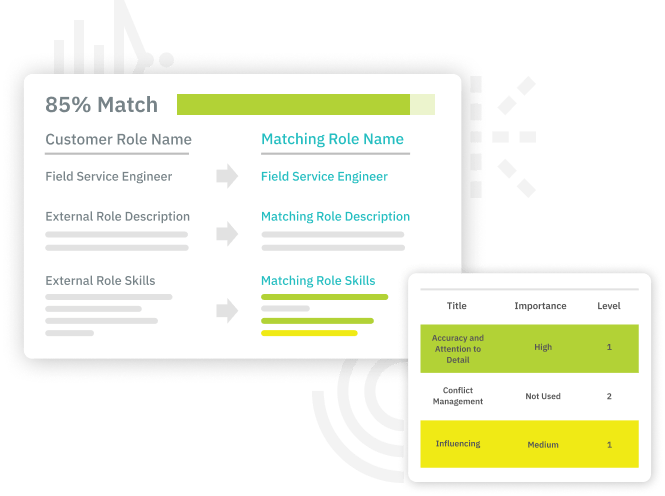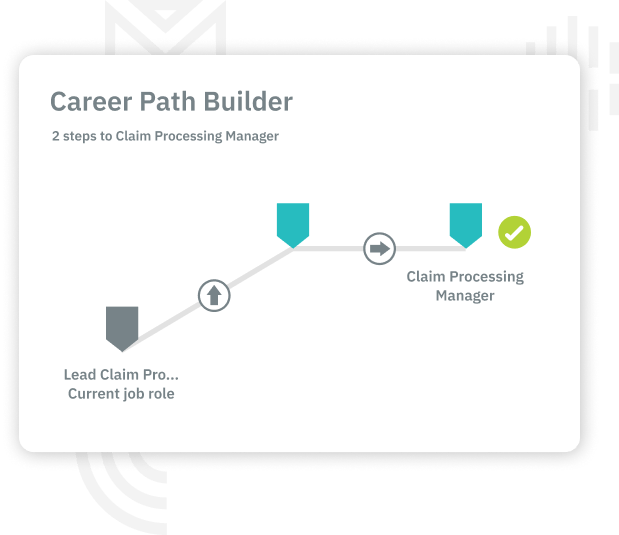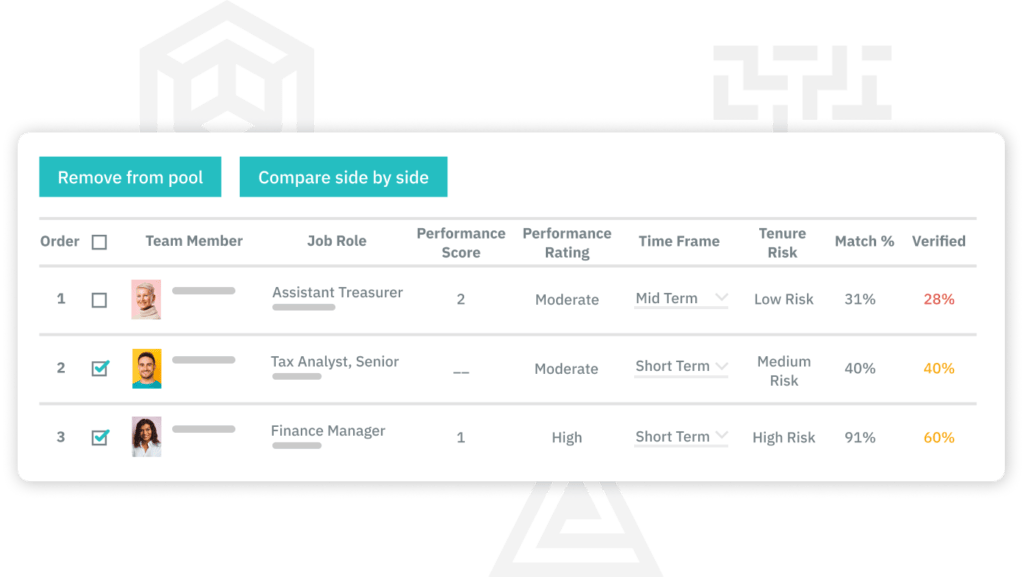Talent Management Framework
The ultimate platform for talent management
Our comprehensive software suite empowers you to cultivate a talent management framework for managing company talent at every level.

Fast & easy build-out with AI
We help you rapidly augment your job role data with skills and proficiencies (if you want them), so everyone is on the same page about the expectations of each role, the skills it requires, and how it interacts with other roles in the company.

Visibility that sparks initiative
Employees can actively explore their possibilities within the company and build career paths tailored to their competencies and goals, whether they’re aiming for the top or happy where they are.

A clear view of future needs
Enable managers to see their teams’ bench strengths, tenure risks, and gaps in role succession so they can develop their people with an eye to the future.

Real-time feedback for better learning
Performance feedback is most powerful when it happens in real time, whether it’s constructive criticism or recognition for a job well done. The performance review can be transparent between manager and employee or employee-only, or manager-only.
See How Our Platform Helps You Build a Future-Ready Workforce
TalentGuard partners with enterprises of 1,000+ employees in the U.S., Europe, Latin America, and regions within six hours of Central U.S., helping leaders reimagine talent strategies and shape the future of work. If you’re uncertain if we serve your area, please email info@talentguard.com.
Select from one of the bundles below and we will tailored the demo to your needs. Let us show you how TalentGuard’s solutions adapt to your industry.
Automate
Create skill profiles, create detailed job descriptions, align learning content with specific skills, and chart clear career path progressions to set the foundation for effective talent management.
Automate includes:
- Create Skill and Competency Profiles
- Develop Job Descriptions
- Map Learning to Skills and Competencies
- Map Career Path Progressions
Assess
Effectively assess their employees’ skills, identify gaps, and implement strategies to develop a skilled and competent workforce prepared to meet current and future challenges.
All the Automate features plus the ability to:
- Create a Skills Inventory
- Conduct Gap Analysis
Engage
Organizations can significantly enhance their talent development strategy and workforce effectiveness by assessing employee skills, curating personalized learning paths, recommending appropriate career paths, and tracking career goals.
All the Automate features plus the ability to:
- Assess Employee Skills and Competencies
- Curate Personalized Employee Learning Paths
- Recommend Employee Career Paths
- Track Career Goals
Optimize
Building talent pools, measuring employee performance, tracking certifications, and conducting multi-rater feedback enhance talent management, ensure compliance, and foster organizational leadership development.
All the Engage features plus the ability to:
- Build Talent Pools
- Measure Employee Performance
- Track Employee Certifications
- Conduct Multi-Rater Leadership Feedback
Trusted by Leading Companies Worldwide




Your Workforce is Evolving — Be Ready for What’s Next
Read our eBook
Additional information
What is a talent management framework? Your organization’s talent framework is the way that you handle the entire lifecycle of your employees. It is the strategy to recruit the best talent, as well as how you foster growth, develop skills and improve retention throughout their time with your company. Some frameworks are manual, but software and automation give your staff better tools to make this complex job more efficient and productive.
Through your talent management software, you can develop a talent management framework that aligns with your business model and needs. Your talent management framework is a strategic plan that helps you achieve an effective talent management process that helps your company meet internal goals.
With comprehensive talent management software, all of the data and tools needed to develop a framework that services your organization are stored in one place for easy management. You can design your framework to service your size, the industry, and your chosen hierarchy. For leaders in your company, this provides a robust tool that saves time and allows for a detailed view of your entire workforce. For employees, this allows for easy access to tools to foster job growth and support their career goals.
Talent Management Strategy
There are many elements of talent management. These include aligning employee engagement, training and development, career pathing, and succession planning with your business strategy. Your overall talent management strategy examples should include each part of these processes.
Recruiting the best talent is an important aspect of building a stellar team, but retaining talent is just as essential. Each part of the management cycle needs to be present in your framework to create a company culture that your employees benefit from and to create a team that helps your company succeed.
There are many different talent management theories and types of business models. Your business should develop a model that works for your type of business and industry. It’s also important to create a strategy for your talent management process. A strategy helps you to achieve the goals that are important to your business’ growth and your team’s success.
Your talent management framework includes all of the strategies you develop to handle the entirety of the employee lifecycle. For many companies, this starts even before recruitment, by developing your employment branding. Things like spotlighting your talent, strategies to land on the “best of” lists for companies to work for, and social media campaigns designed to showcase the benefits of working with your organization.
Each employee at your organization is unique. This means you’ll need a robust solution to help you manage the whole picture of your human capital while still serving each individual employee in the best way possible. This includes performance reviews, training opportunities, tools to facilitate internal promotions and succession planning, cross-training options, and more.
Why Is Talent Management Important?
Talent development trends have changed significantly throughout the years. Many HR departments once concentrated only on hiring, payroll, and benefits. Today, they focus more fully on talent management and competitive advantages that will not only attract top talent, but foster a culture where employees want to stay long-term.
A whole workforce strategy example includes more than recruitment. Talent management skills encompass every aspect of retention and development to ensure organizational success on all levels. All these various aspects of the employee lifecycle are connected and need to be invested in both individually and as a whole framework.
High caliber talent is looking for more than a specific salary or benefits. Those are contributing factors, but they’re also looking for additional benefits, such as training, development, and room for growth. The talent marketplace has become increasingly competitive in recent years. High quality employees have many options in where they want to work. Companies that take time to foster a full experience that include options for development, career pathing that allows employees visibility into higher positions they aspire to, and other desirable benefits have a greater capacity to attract top talent.
When your current employees enjoy their work experience, they act as employment ambassadors. They are more likely to recommend colleagues for positions at your company when they feel confident that their connections will love the company. Companies that prioritize talent management see higher rates of employee satisfaction and retention.
Talent Management Best Practices
What are the talent management strategies of leading companies? This is a great question to ask as you start to develop or improve your own talent management models. You’ll want to narrow down talent management functions that fit your own organizational goals. However, companies with best talent management practices can offer an excellent example of strategies that are productive and efficient.
Companies that prioritize employee engagement are miles ahead of organizations that follow more traditional, outdated models. Talent today has more options in terms of where they can work, and this is a good thing for your organization. Fostering an environment where your employees are supported to succeed also translates to higher productivity and overall satisfaction.
A winning company culture is important for your employee’s mental, emotional, and physical health, but it’s more than just that. It also translates to higher profits and lower employee turnover. When you prioritize employee engagement, you’re able to dial into the pain points your employees have in fulfilling their tasks. This means that your organization is better equipped to continually improve efficiency and increase employee satisfaction at the same time.
Companies that use the best practices in talent management are highly organized. They research and develop solutions that allow them to access all of the information they need to plan career paths and succession. Manually, these tasks can take many hours, especially in a larger workforce. It is difficult to collect all the data you need for a full picture of each employee’s strengths and proficiencies without a robust solution.
Using a solid software solution that gives you one place for management to access all of the data they need can save a great deal of time. It also means that management will be able to highlight employees they may not have noticed without the quick access to the right information. For employees, this is also a benefit. It helps them map out their own career growth plans and work to develop the skills they need to flourish in your company.
What is a Talent Management Framework?
A talent management framework is the structured blueprint your organization uses to attract, develop, assess, and retain employees in alignment with business goals. At its core, it defines the end-to-end talent lifecycle: from recruitment and onboarding to performance management, succession planning, and beyond. Think of it as the spine of your people’s strategy—providing clear roles, responsibilities, processes, and metrics at every stage.
While often used interchangeably with a talent strategy framework, a proper framework goes deeper by mapping out the tools, technologies, and stakeholder accountabilities needed to execute that strategy. It also complements a talent development framework—focusing specifically on the learning paths and competency models that turn high-potential candidates into future leaders.
Why Does Your Organization Need a Talent Management Framework?
Without a formal framework, talent efforts become siloed, reactive, and nearly impossible to measure. By implementing a talent management strategy framework, you ensure that every hire, promotion, or development plan directly supports your business objectives—scaling quickly, innovating in new markets, or improving customer satisfaction.
Moreover, a high-impact talent management framework reduces risk and costs. When you proactively identify skill gaps through a talent assessment framework and systematize career conversations via a talent review framework, you limit turnover and bench strength vulnerabilities. That translates into stronger bench talent, faster internal mobility, and a culture where employees see a clear future, boosting engagement and retention.
Components of an Effective Talent Management Framework
- Talent Acquisition Strategy Framework: Implement a targeted sourcing strategy and conduct structured, competency-based interviews to ensure each hire fits your framework.
- Talent Assessment Framework: Competency-based assessments, psychometric tools, and AI-driven skill mapping to benchmark potential and performance.
- Talent Development Framework: Curated learning paths, on-the-job rotations, and coaching programs that bridge identified gaps.
- Talent Review Framework: Regular calibration sessions and performance calibration to ensure transparent, bias-resistant talent decisions.
- Succession Planning & Career Pathing: Defined career ladders and pipelines so high-potential employees understand their next moves—see our Career Pathing Canvas features for how TalentGuard brings this to life.
- Performance Management: Real-time feedback loops, 360-degree reviews, and goal tracking that keep everyone aligned on outcomes.
Together, these components create the scaffolding for a holistic approach—ensuring that each function (from recruitment through development) reinforces the others rather than operating in isolation.
Best Practices for Creating a Comprehensive Talent Management Framework
Start with Business Outcomes
Anchor your framework to no more than 3–5 strategic objectives (e.g., “increase leadership bench strength by 20% in two years”). This clarity ensures your talent management framework example drives measurable results rather than vanity metrics.
Leverage Data, Don’t Gut Feelings
Build or integrate a talent assessment framework powered by analytics. Use dashboards to track key indicators—time to fill, internal promotion rate, certification completion—and adjust your framework in real time.
Design for Scalability
A talent development framework that relies solely on ad-hoc workshops will collapse as you grow. Invest in software and automation early so your framework scales up without exploding in complexity.
Embed Continuous Review
Formalize your talent review framework with quarterly calibration sessions. This cadence keeps leadership accountable and surfaces flight risks before they become vacancies.
Communicate and Train
A framework only works if stakeholders know their part. To ensure everyone is on the same page, roll out manager and employee training on how to use each component—especially your AI-driven tools.
Steps to Develop a Talent Management Framework
- Map Your Current State: Begin by mapping out your current talent lifecycle workflows—this includes how you recruit new hires, onboard them, conduct performance evaluations, deliver learning and development programs, and plan for succession. Then, scrutinize each workflow to uncover redundant steps, process gaps, or handoffs that rely heavily on manual effort.
- Define Competency Models: Work with business leaders to articulate the skills and behaviors required at each organizational level. This becomes the foundation for your talent acquisition strategy framework and development plans.
- Select Technology & Tools: Evaluate platforms that support end-to-end workflows, such as assessment, learning management, career pathing, and analytics. Prioritize solutions with seamless integration.
- Build Governance: Establish a talent council or steering committee responsible for framework oversight, governance policies, and decision rights.
- Pilot & Iterate: Roll out your framework in one business unit or region. Gather feedback, measure impact, and refine before a company-wide launch.
- Scale & Sustain: Once validated, extend the framework globally. Embed ongoing training, quarterly talent reviews, and annual audits to keep the framework current.
Following these six steps ensures your talent management framework is not just a static document, but a living system that evolves with your organization.

